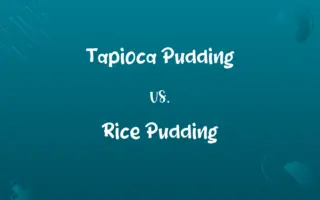Carbohydrates vs. Protein: Know the Difference

By Shumaila Saeed || Published on January 31, 2024
Carbohydrates are organic compounds primarily used for energy, composed of carbon, hydrogen, and oxygen, while proteins are large biomolecules essential for structure, function, and regulation of the body's tissues and organs.

Key Differences
Carbohydrates are macronutrients primarily serving as a quick energy source, composed of sugars and starches. Proteins, on the other hand, are complex molecules made up of amino acids, essential for building and repairing tissues and making enzymes and hormones.
Shumaila Saeed
Jan 31, 2024
Carbohydrates are classified into simple (sugars) and complex (starches and fiber), affecting the body’s blood sugar levels differently. Proteins are distinguished by their amino acid compositions, with essential amino acids that the body cannot synthesize and must be obtained through diet.
Shumaila Saeed
Jan 31, 2024
The primary function of carbohydrates in the body is to provide energy, especially for the brain and during physical activity. Proteins play a crucial role in building and maintaining muscles, skin, and organs, and are involved in virtually every process within cells.
Shumaila Saeed
Jan 31, 2024
Excess carbohydrates can be stored in the body as fat, while excess protein intake can put strain on the kidneys. Balanced intake of both carbohydrates and proteins is important for optimal health and functioning.
Shumaila Saeed
Jan 31, 2024
Carbohydrates are found in foods like grains, fruits, vegetables, and dairy products. Protein sources include meat, poultry, fish, eggs, dairy products, legumes, and nuts.
Shumaila Saeed
Jan 31, 2024
ADVERTISEMENT
Comparison Chart
Primary Function
Energy source
Building and repairing tissues, making enzymes
Shumaila Saeed
Jan 31, 2024
Types
Simple (sugars) and complex (starches, fiber)
Essential and non-essential amino acids
Shumaila Saeed
Jan 31, 2024
Dietary Sources
Grains, fruits, vegetables, dairy
Meat, fish, eggs, dairy, legumes, nuts
Shumaila Saeed
Jan 31, 2024
ADVERTISEMENT
Carbohydrates and Protein Definitions
Carbohydrates
They consist of sugars, starches, and fiber.
Fruits are a natural source of simple carbohydrates.
Shumaila Saeed
Jan 11, 2024
Protein
They consist of essential and non-essential amino acids.
Meat provides all the essential amino acids needed in the diet.
Shumaila Saeed
Jan 11, 2024
Carbohydrates
Carbohydrates are organic compounds serving as a key energy source.
Rice and pasta are high in carbohydrates.
Shumaila Saeed
Jan 11, 2024
Protein
Protein can be used by the body for energy when necessary.
In the absence of carbohydrates, the body may use protein for energy.
Shumaila Saeed
Jan 11, 2024
Carbohydrates
They are categorized into simple and complex types.
Whole grains are a good source of complex carbohydrates.
Shumaila Saeed
Jan 11, 2024
ADVERTISEMENT
Protein
Proteins are large biomolecules made of amino acids.
Eggs are a high-quality source of protein.
Shumaila Saeed
Jan 11, 2024
Carbohydrates
Carbohydrates can be stored in the body as glycogen or fat.
Excess carbohydrates are stored as fat for future energy needs.
Shumaila Saeed
Jan 11, 2024
Protein
They are essential for the structure and function of body tissues.
Protein intake is crucial for muscle repair and growth.
Shumaila Saeed
Jan 11, 2024
Carbohydrates
Carbohydrates are essential for brain function and physical activity.
Athletes often eat carbohydrate-rich foods for energy.
Shumaila Saeed
Jan 11, 2024
Protein
Proteins are involved in immune response and metabolic processes.
Enzymes, crucial for digestion, are a type of protein.
Shumaila Saeed
Jan 11, 2024
Carbohydrates
Any of a group of organic compounds, including sugars, starches, celluloses, and gums, that contain only carbon, hydrogen, and oxygen and that originate chiefly as products of photosynthesis. Carbohydrates serve as a major energy source for living things.
Shumaila Saeed
Jan 11, 2024
Protein
Any of a group of complex organic macromolecules that contain carbon, hydrogen, oxygen, nitrogen, and usually sulfur and are composed of one or more chains of amino acids. Proteins are fundamental components of all living cells and include many substances, such as enzymes, hormones, and antibodies, that are necessary for the proper functioning of an organism. They are essential in the diet of animals for the growth and repair of tissue and can be obtained from foods such as meat, fish, eggs, milk, and legumes.
Shumaila Saeed
Jan 11, 2024
Carbohydrates
A food, such as bread, rice, or potatoes, that is composed largely of these substances.
Shumaila Saeed
Jan 11, 2024
Protein
Any of numerous large, complex naturally-produced molecules composed of one or more long chains of amino acids, in which the amino acid groups are held together by peptide bonds.
Amino acid
Shumaila Saeed
Jan 11, 2024
Protein
One of three major classes of food or source of food energy (4 kcal/gram) abundant in animal-derived foods i.e. meat and some vegetables, such as legumes.
Shumaila Saeed
Jan 11, 2024
Protein
In chemical analysis, the total nitrogenous material in vegetable or animal substances, obtained by multiplying the total nitrogen found by a factor, usually 6.25, assuming most proteids to contain approximately 16 per cent of nitrogen.
Shumaila Saeed
Jan 11, 2024
Protein
Any polymer of an amino acid joined by peptide (amide) bonds. Most natural proteins have alpha-amino acids as the monomeric constituents. All classical enzymes are composed of protein, and control most of the biochemical transformations carrie dout in living cells. They may be soluble, as casein, albumins, and other globular proteins, or insoluble (e. g. "structural proteins"), as collagen or keratin. "albumin", an older term for protein, is now used primarily to refer to certain specific soluble globular proteins found in eggs or blood serum, e.g. bovine serum albumin, the main soluble protein in teh serum of cattle, used as an enzymatically inert protein in biochemical research.
Shumaila Saeed
Jan 11, 2024
Protein
Any of a large group of nitrogenous organic compounds that are essential constituents of living cells; consist of polymers of amino acids; essential in the diet of animals for growth and for repair of tissues; can be obtained from meat and eggs and milk and legumes;
A diet high in protein
Shumaila Saeed
Jan 11, 2024
Repeatedly Asked Queries
How do carbohydrates affect energy levels?
Carbohydrates provide a quick source of energy, impacting blood sugar and energy levels.
Shumaila Saeed
Jan 31, 2024
What are proteins?
Proteins are large biomolecules composed of amino acids, vital for the structure and function of the body.
Shumaila Saeed
Jan 31, 2024
What role do proteins play in muscle building?
Proteins are essential for muscle repair and growth, especially after exercise.
Shumaila Saeed
Jan 31, 2024
What are good sources of protein?
Meat, fish, dairy, legumes, and nuts are excellent protein sources.
Shumaila Saeed
Jan 31, 2024
Can carbohydrates be stored in the body?
Yes, excess carbohydrates can be stored as glycogen in muscles and liver or as fat.
Shumaila Saeed
Jan 31, 2024
What foods are high in carbohydrates?
Foods like bread, pasta, fruits, and vegetables are high in carbohydrates.
Shumaila Saeed
Jan 31, 2024
What are carbohydrates?
Carbohydrates are organic compounds that serve as a primary energy source for the body.
Shumaila Saeed
Jan 31, 2024
How many essential amino acids do humans need, and where do we get them?
Humans need nine essential amino acids, which must be obtained through the diet from protein-rich foods.
Shumaila Saeed
Jan 31, 2024
Are all proteins in food equally beneficial for health?
Proteins from different sources vary in their amino acid composition and health benefits; lean protein sources are generally healthier choices.
Shumaila Saeed
Jan 31, 2024
What is the primary function of proteins in the body?
Proteins play a crucial role in building and repairing tissues, enzymes for biochemical reactions, and serving as antibodies and hormones.
Shumaila Saeed
Jan 31, 2024
Can carbohydrates be converted into proteins by the body?
Yes, the body can convert excess carbohydrates into proteins, but it is not an efficient process.
Shumaila Saeed
Jan 31, 2024
What is the glycemic index, and how does it relate to carbohydrates?
The glycemic index measures how quickly carbohydrates in food raise blood sugar levels; it's used to assess their impact on blood glucose.
Shumaila Saeed
Jan 31, 2024
Can protein intake affect muscle growth and repair?
Yes, consuming enough protein is essential for muscle growth, repair, and maintenance, particularly for those engaged in physical activity.
Shumaila Saeed
Jan 31, 2024
Do carbohydrates and proteins work together in the body?
Yes, they often work together to provide energy and support various bodily functions, particularly during exercise.
Shumaila Saeed
Jan 31, 2024
Can a lack of dietary protein lead to health problems?
Yes, a deficiency in dietary protein can lead to muscle wasting, weakened immune function, and other health issues.
Shumaila Saeed
Jan 31, 2024
Can carbohydrates lead to weight gain?
Excess consumption of refined or sugary carbohydrates can contribute to weight gain, but when consumed in moderation, they are part of a balanced diet.
Shumaila Saeed
Jan 31, 2024
Do carbohydrates play a role in brain function?
Yes, carbohydrates are essential for brain function as they provide glucose, the brain's primary energy source.
Shumaila Saeed
Jan 31, 2024
Can excessive consumption of proteins have negative health effects?
Yes, excessive protein intake can strain the kidneys and may lead to health issues, so it's important to consume proteins in moderation as part of a balanced diet.
Shumaila Saeed
Jan 31, 2024
Are all carbohydrates equally beneficial for health?
No, some carbohydrates are healthier than others; complex carbohydrates and fiber-rich foods are generally considered more beneficial.
Shumaila Saeed
Jan 31, 2024
Share this page
Link for your blog / website
HTML
Link to share via messenger
About Author
Written by
Shumaila SaeedShumaila Saeed, an expert content creator with 6 years of experience, specializes in distilling complex topics into easily digestible comparisons, shining a light on the nuances that both inform and educate readers with clarity and accuracy.






































































